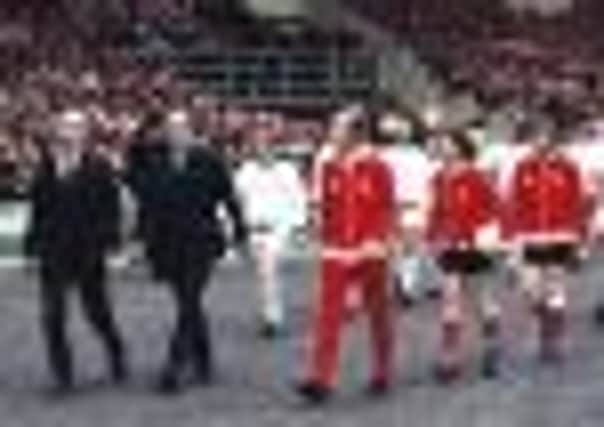Brilliant scribes of the beautiful game


Adam Powley set himself a task any football fan would relish.
The challenge was to revisit pivotal games and famous victories from the last 100 years and pull together a selection of stand-out match reports. Working alongside Richard Havers, the result is Those Were The Games: A Nostalgic Look at a Century of Great Football Matches.
Advertisement
Hide AdAdvertisement
Hide AdThe book opens with a fixture round-up from 1903 and ends at Liverpool’s historic European triumph in 2005 and Adam admits there was no shortage of good material.
“In terms of memorable matches, the Leeds games from the 70s really stood out for me because they were such a good side,” he says
“But myself and Richard didn’t just want to pick our favourites, we wanted to present a rounded picture on how football was reported.”
Part of a series called When Football Was Football, the book is unapologetically nostalgic. The recollections are accompanied by evocative images of players and stadiums from previous generations.
Advertisement
Hide AdAdvertisement
Hide Ad“It will especially appeal to people who are football fans now but pine a bit for how the game was back then,” said Adam. “It’s a nice way of celebrating teams and players of past matches and revelling in that rich heritage that football has. It’s a trip down memory lane.”
Reared on a distinct brand of sports journalism pre-dating the rolling bulletins, 24-hour news coverage and heavy analysis associated with the modern game, Adam, a former football writer for the Sunday Mirror, looked up to journalists like the Mirror’s Ken Jones, Frank McGhee and the Independent’s Harry Miller.
Men who were armed with only a shorthand pad and a penchant for brutally honest reporting, they brought the games alive with their descriptive accounts for those who could not attend the matches themselves.
“They could tell a story beautifully in 300 words or less and really make you feel part of the occasion,” says Adam. “It’s like that quote from the journalist Rob Steen – the report is there to enable you to hear the crowd and smell the hot dogs. These were writers who were able to do that.”
Advertisement
Hide AdAdvertisement
Hide AdThe changes to how people watched football throughout the years resulted in a shift in the way the game was reported. Cameras began to cover matches from every possible angle, slow motion replays were introduced and now anybody with the internet has instant access to highlights. However, none of this, Adam says, is necessarily resulting in poorer football reporting.
“A sports journalist now has to add their own opinion to what’s already out there. In some respects, sports journalism has never been healthier. There are some really good writers who provide informative, engaging and entertaining coverage,
“I also think that times have moved on. Old match reports, in some respects, wouldn’t suit the modern game. ”
Currently teaching sports journalism at the University of the Creative Arts in Farnham, Surrey, Adam often shows the old match reports to his students.
Advertisement
Hide AdAdvertisement
Hide Ad“It’s kind of like – look – this is how they did it. If you want to learn the craft, have a read of what these people wrote and look how it was all put together.”
Adam believes that there has never been a better time to be a sports journalist. Anybody can set up a blog, but with everything being offered for free, he also recognises it’s the hardest time to earn a living from it.
“The most important thing now is that football should be a conversation – not just journalists issuing their pearls of wisdom down from the top.”
Adam also believes that the premiership is in the best state it’s ever been in, with teams like Manchester City spending millions on players and becoming genuine contenders in Europe and at home.
Advertisement
Hide AdAdvertisement
Hide Ad“At the moment we have billionaires who have moved in and seen an opportunity, and the game is in very rude health as a result,” he says. “The premiership is enormously popular and the product is a good one to sell. Football can suffer when it’s dominated by the same big teams. It’s not just in England – it happens in Europe too. It’s always good to have variety.”
And as for Leeds United?
“The top division doesn’t feel quite right not having them in there. They’re making a recovery and Simon Grayson seems to know what he’s doing. Leeds are a big club and they’ll bounce back.”
Those Were The Games: A Nostalgic Look at a Century of Great Football Matches is published by JH Haynes, priced £10.99.
Football writers with perfect pitch
Leeds struck the bar before they collected their fourth in the 80th minute... The hearts were pounding and Wilkinson’s pulse rate racing as Leeds narrowly failed to become the first British club to recover a three-goal deficit.
Advertisement
Hide AdAdvertisement
Hide Ad(Harry Harris on Leeds United v Stuttgart in the 1992 Champions League).
With 90 minutes gone they were stretched like blue shadows on the green of Wembley’s turf... Busby hovered over them, hen-like – encouraging, anxious and fearing, perhaps, that the worst was to come.
(Ken Jones on Manchester United v Benfica in the 1968 European Cup Final).